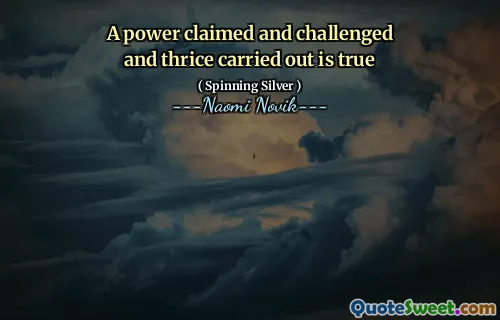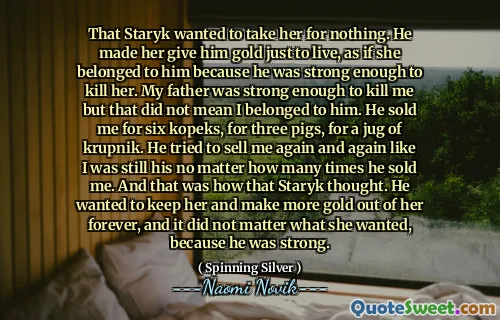
That Staryk wanted to take her for nothing. He made her give him gold just to live, as if she belonged to him because he was strong enough to kill her. My father was strong enough to kill me but that did not mean I belonged to him. He sold me for six kopeks, for three pigs, for a jug of krupnik. He tried to sell me again and again like I was still his no matter how many times he sold me. And that was how that Staryk thought. He wanted to keep her and make more gold out of her forever, and it did not matter what she wanted, because he was strong.
This passage deeply explores themes of power, autonomy, and the painful commodification of individuals within oppressive relationships. The speaker confronts the brutal reality that strength or force does not grant ownership or rightful control over another person. The metaphor of being sold repeatedly, as if one's identity and freedom could be traded like mere goods, highlights a tragic dehumanization. The comparison between the speaker's father and Staryk reveals a disturbing parallel in the ways power can corrupt relationships, reducing unique human lives to assets to be exploited for gain. Yet the speaker implicitly rejects the idea that physical strength gives any moral or rightful claim over a person.
Naomi Novik’s "Spinning Silver" often weaves fairy tale motifs with real human emotional struggles, and this quote fits perfectly within that context. It brings forward the conflict between agency and oppression, showcasing how historical or fantastic elements mirror true human dilemmas about freedom, safety, and coercion. The emotional intensity arises from the forced transactions, the repeated attempts to own or profit from a person’s very existence, emphasizing the cruel paradox of strength used as a means of ownership. The speaker’s resistance against this logic - that might does not equal right - presents a powerful moral stand, inviting readers to rethink assumptions about power, control, and belonging. This reflection urges us to understand that no matter how strong a person or entity might be, no one ever truly belongs to another. In this way, the quote resonates beyond its narrative into universal themes of respect, dignity, and human rights.







